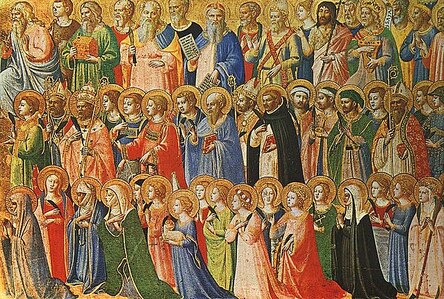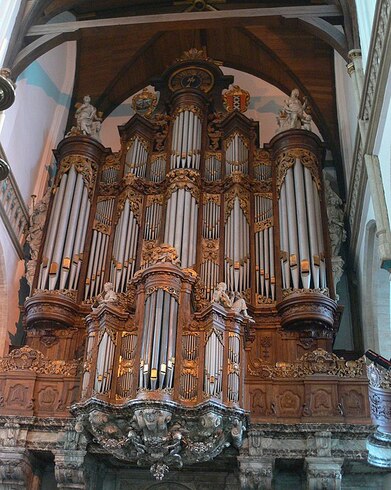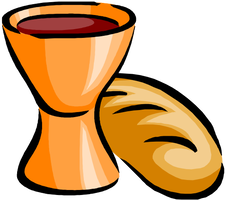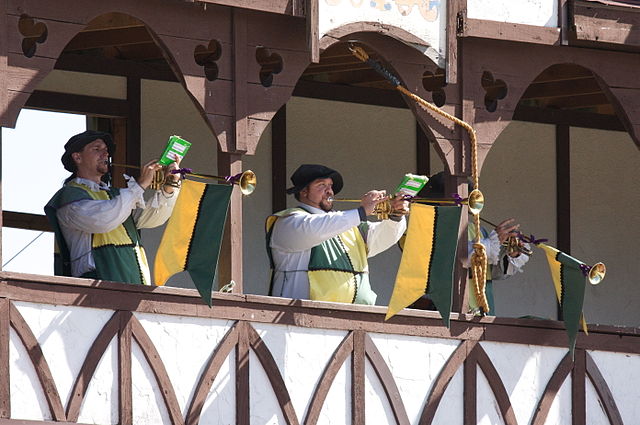 By Fra Angelico - Originally from en.wikipedia; description page is/was here. Transfer was stated to be made by User:richardprins, Original uploader was Sampo Torgo at en.wikipedia, Public Domain, https://commons.wikimedia.org/w/index.php?curid=3000363 By Fra Angelico - Originally from en.wikipedia; description page is/was here. Transfer was stated to be made by User:richardprins, Original uploader was Sampo Torgo at en.wikipedia, Public Domain, https://commons.wikimedia.org/w/index.php?curid=3000363 Music and text connoting peace, eternal light and life, and the Church Triumphant will be presented this Totenfest and All Saints' Sunday morning. An elegy can be defined as a lament for the dead, a sad poem. This literary term, as with many other literary terms, have musical counterparts as well. Such an example is the meditative "Elegy" by George Thalben-Ball, his most well-known work. It was conceived during a live religious service broadcast on BBC radio during World War II. The service ended earlier than planned and so he improvised a piece which, due to interest by listeners, was reconstructed and published as "Elegy". And so this Sunday's services begin in an introspective space as we remember those who have passed on over the year. For the closing voluntary, a joyous setting of the hymn tune "Lasst uns erfreuen" (Let us rejoice most heartily) reminds us of the bliss that awaits. The tune has been paired with several texts over the centuries. Our Doxology this fall is an example as are the hymns "Ye Watchers and Ye Holy Ones" and "All Creatures of Our God and King." On this special Sunday of the liturgical year, we will also hear two choral offerings by two of Plymouth's vocal ensembles. The Chamber Choir, an auditioned group of Plymouth members and fine vocalists from the community, offer the sublime "Illuminate (Lux aeterna)" by Matthew Wheeler at both morning services. The anthem was composed in memoriam to his father and expresses a journey from the shadows of despair to the promise of Light's return. "Lux aeterna" (Latin for "perpetual light") and additional select texts from the traditional requiem mass are interwoven into the English text creating a tapestry of personal feelings of loss and hope with an ancient liturgical underpinning. At 11:00, the Chancel Choir sings "We Are Surrounded" by Joseph Martin. The words by J. Paul Wiliams, based on Hebrews 12.1-3, call us to heed the will of God as those saints before us have done so well. At 6:00 p.m., join us for a service of simplicity and peace as we share a humble meal together and sing chants from the Taizé tradition. Bobby and Blair are joined by flutist Aaron McGrew for this beautiful service of evening prayer.
0 Comments
 By SriMesh - Own work, Public Domain By SriMesh - Own work, Public Domain In celebration of Consecration Sunday, the Chancel Choir offers Bob Chilcott's A Little Jazz Mass during the 9:00 and 11:00 a.m. services. British composer Bob Chilcott composed the mass as a commission for the 2004 Crescent City Children's Choral Festival in New Orleans, debuting at St Louis Cathedral, New Orleans in June of the same year. The work is a Missa brevis (Latin for "short mass") in five sections. Chilcott expresses several facets of jazz throughout this twelve minute work: the Kyrie has a groove, the Gloria truly swings, a serenity permeates the Sanctus, the Benedictus has an easy strut, and the blues is felt in the Agnus Dei. Pianist Bobby Brannock and bassist Cameron Collums will help bring this quirky yet elegant reading of the traditional Mass text to life. For the Prelude, a selection from William Bolcom's Gospel Preludes, "Sweet Hour of Prayer", will set the musical tone in a hybrid of art music, jazz, and gospel. The perennial hymn of the Reformation, "A Mighty Fortress", is given a contemporary and rhythmic setting by Charles Ore for the Postlude. At 6:00 p.m., the strains of jazz will still be heard as Bobby and Blair are joined by bassist Cameron Collums and guitarist Alan Skowron for original arrangements and a head by Wayne Shorter. Webster's Dictionary provides two definitions of a fanfare: "a short and lively sounding of trumpets" and "a showy outward display." Fanfares have been used in art music since the 14th century as introductions and exciting instrumental flourishes with or without the traditional brass instrumentation. This Sunday morning, three fanfares will be presented in three very different ways though all expressing the character of a fervent musical announcement.
Italian organ virtuoso/composer Marco Enrico Bossi concertized and wrote prolifically for the organ until his untimely death in 1925. His Piccola Fanfara (translated as "little fanfare") is a brief work that is both playful and exclamatory, expressing characteristics of a scherzo. Gopsal, one of only three hymn tunes composed by G.F. Handel, is the subject of a British-style fanfare treatment by Sir David Willcocks. An opening toccata with the melody underlaid in the pedal leads to a Tuba stop punctuation of the closing phrase, culminating in a grand long final chord. The Plymouth Ringers offer Fanfare Allegro by Jeff Batdorf. Beginning with a regal chordal statement, the piece then introduces a Latin-flavored rhythm pulsing under a florid melodic motif which continues throughout this quirky light-hearted work. The Chancel Choir sings The Splendour of the House of God by famed Iona Community composer John Bell. Arranged for chorus by Frikki Walker, the anthem was commissioned for the restoration of the Cathedral Church of St. Mary the Virgin in Glasgow, Scotland. You, the congregation, will be invited to sing on the refrain of this hymn-anthem declaring the glory of God's church on earth. At 6:00 p.m., Bobby and Blair will be joined by harpist Alaina Bongers and flutist Rebecca Quillen for an evening of contemplative and Celtic sounds.  By Remi Mathis - Own work, CC BY-SA 3.0, https://commons.wikimedia.org/w/index.php?curid=19387549 By Remi Mathis - Own work, CC BY-SA 3.0, https://commons.wikimedia.org/w/index.php?curid=19387549 To the early Baroque period we go this Sunday morning with selections from across the European continent. From the Netherlands, a set of variations on the 16th century Lutheran hymn "Allein Gott in der Höh sei Ehr" (To God Alone on High be Glory) by Jan Pieterszoon Sweelinck (1562-1621). Sweelinck spent the majority of his life in Amsterdam as a renowned organist and teacher. His students and influence would help create the North German organ tradition to follow resulting in luminaries such as Dietrich Buxtehude, Friedrich Zachow, and J.S. Bach. French Baroque organ music developed quite differently from other European traditions, emphasizing color and ornamentation over counterpoint. The "Elevation" from Francois Couperin's "Mass for the Convents" demonstrates this beautifully with sweet flute tones supporting a melody on a Tierce combination stop with pedals providing only harmonic undertones. Francois Couperin was the most well-known member of his family's musical dynasty which spanned nearly 150 years. A similar musical lineage occurred in Germany with the Bachs, of course, but also in the Pachelbel family, prominently Johann and his sons Wilhelm Hieronymus and Charles Theodore. The father, famously known for his "Canon in D," wrote organ works influenced by southern German composers such as Forberger and the Italian composer Girolamo Frescobaldi. His works were succinct and direct, as evidenced in "Toccata in E Minor." The Chancel Choir offers a decidedly non-Baroque work by Mark Miller in "God Has Work for Us to Do". It is a call to action in a world rife with injustice and corruption. A welcome complement to this month's focus on stewardship and support for the mission of Plymouth.  On this World Communion Sunday, a prelude by Spanish musicologist and composer Nemesio Otaño sets a meditative tone for worship at 11:00. At the early service, percussionist Michael Hamilton and I offer an arrangement of "Let Us Talents and Tongues Employ," a Eucharistic hymn set to a Jamaican folk song. A Latin-flavored toccata on the hymn tune "Lobe den Herrn, meine Seele" (Praise the Lord, my Soul) by German organ virtuoso Hans-André Stamm closes the services. The Chancel Choir offers "One World" by Linda Kachelmeier featuring percussion, soloist Blair Carpenter and a vocal trio of Karen Dawson, Janet Hanlon, and Jennifer Stimson. This work was commissioned for World Communion Sunday 2012 by First Presbyterian Church, South Saint Paul, Minnesota for the composer's twenty years of music ministry there. |
Details
|


 RSS Feed
RSS Feed